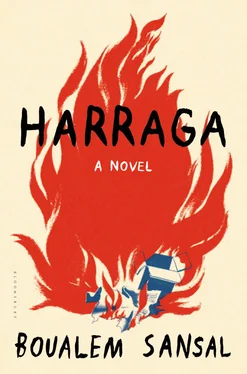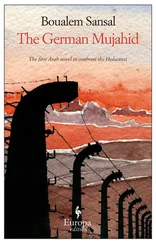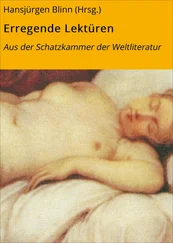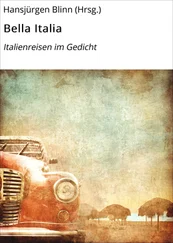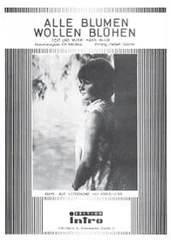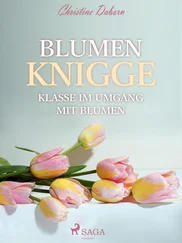I dubbed him Bluebeard. A memory from the past, from a childhood spent reading, but also a stupid, cruel reference to the present in which les barbus — the bearded men — oppress this country and its banlieues beyond the seas, beyond religion, leaving nature but a straw through which to breathe.
I finally decided that my particular barbu is harmless, if a little mysterious. If he has a beard, it’s probably just because he doesn’t shave. I can’t believe that this ghost, this character out of Grimm’s fairytales, cultivates his facial hair as part of a fanatical ideology consumed with hatred. He probably loves his beard, and those who love, suffer. On the other hand, the real Bluebeard cut women’s throats, a fact that briefly gives me pause for thought. But there’s nothing to say that my Bluebeard even has a beard, that’s just how I picture him, what I named him, because these days the beard is the symbol of the evil that lurks all around, gnaws away at us, the evil that kills. In any case, whether or not he has a beard, Bluebeard is a part of my life. I share my solitude with him, as he perhaps shares his with me. There is no escape, we are caught in the same net, we breathe the same polluted air, separated only by a narrow street and two sets of shutters, mine and his, both crumbling with age. It’s not as though I could go over there, knock on the door and ask him to move out. What if he turned out to be a ghost?
This house has known happier times, when the whole family was in residence. Papa, Maman, my big brother Yacine and little Sofiane, who was growing like a little devil, not to mention the puppies in the courtyard and the kittens under our feet and — how could I forget? — a beautiful pair of short-lived lovebirds in an intricately carved cage that hung in our living room like a chandelier in a palace. Everywhere, there were lush, green plants, hanging from macramé potholders we made ourselves. Out in the garden, silent and invisible, a tortoise lived out its life at its own pace, nibbling everything in its path. Sometimes, we would accidentally step on it but nothing happened, these tender creatures are so well armoured they’ve never needed to learn to scream. And there was me, Lamia, a pretty, bubbly daughter of the house, born midway between the two boys. Maman’s women friends came and went as they pleased, they stayed, they talked, they helped themselves to endless cups of sugar, floor, couscous and so forth. One day, I’ll demand every cupful back and bankrupt them. I should think about them more often. Thanks to them, we knew every secret, no one was better at nosing out a dead body, we would have been lost without their skills. Our afternoons were enlivened as we listened to the sins of our neighbours. The worst thing that could happen was for us to fall asleep after lunch, so we did everything we possibly could to stay awake. It was not that I felt we were listening to some terrible tragedy, but I sensed that, being girls, we needed to find out what life held in store for us in the future. Since the house was as riddled with holes as Swiss cheese, every local breeze arranged to meet there. On every corner there was some girl or boy asking after one of my brothers. There was no reason to panic, but all this commotion was contagious. Doors slammed and the crash-bang-wallop scampered along the walls to join in the collective hysteria. Music blared at ear-splitting volume, yéyé and 1960s pop were all the rage: Johnny Hallyday, Eddy Mitchell, Les Chats Sauvages, Les Algers, these were our idols. We were young, we lacked gravitas. The truth is, we made more noise than an army barracks on R & R. During the War of Independence, Papa had fought with the maquis and so earned the coveted title of veteran moudjahid entitling him to a pension, which, after long years of repeated applications, finally arrived like manna from heaven. Nationalism is a terrible thing. Cholera is easier to survive. But Papa had the good grace to keep his sickness to himself and never imposed his ailments on us. ‘A country liberated by its own people, what could be more normal than that!’ he’d mutter every night, listening as the TV recounted the litany of the dead and the maimed as a miracle. His pension was not enough to provide food for the lovebirds, so he went to work in a state factory that made — what was it? — I can’t remember. Papa was constantly bending our ears, complaining about all the things that were wrong with the factory which, we were convinced, manufactured rusty widgets or churned out scraps and memos for the Head of State, known as the country’s foreman. The constant harping about ‘dead wood’, which peppered his laments, sounded to my young ears like ‘redwood’ and I imagined some miraculous tree had sprouted in the middle of the factory, something which conferred a mysterious significance on his pronouncement, though I never dared to ask the question. But at home things were fine. The comings and goings, the shouting and screaming, the clattering footsteps, the whispered secrets, the squabbles, the fights, all made for stormy days and leisurely evenings. There is nothing better than the calm that comes after war. The kittens purred in utter bliss. They had a way of curling up into a ball that commanded respect, they looked as though they would be ready even if the sky should fall. We were as hypnotised as they were comatose, and before long our snores and their purrs began to resonate and the house retreated into a cocoon of cotton wool. My happiness would have been complete and I would have thanked God unreservedly if only I had had a little sister. ‘You should thank Him anyway,’ Louiza would say, ‘having sisters is worse than having spots.’ Louiza, my best friend from school, was plagued with freckles and devastated that she did not have a little brother to look after. With her permanently stunned expression and her big buck teeth, she might have looked like she was crazy but she was sweet as could be and I thought she was cute. She had freckles like raisins and a shock of red hair; she looked good enough to eat. So we nicknamed her Carrot Cake. We’d cup our hands and yell, ‘Come here and give us a bite!’ This warhead detonated in three stages: first she would pull a face, then force a laugh, then — bam — she’d burst into tears. We would cover her in kisses to staunch the flow, petrified in case the cavalry showed up. Her mother was more terrifying than the whole Mexican army. I was often teased myself, given that I was a collection of… well, we don’t need to talk about that, it’s ancient history. ‘I wish I had a little brother,’ Louiza would wail. ‘I wish I had a little sister,’ I’d sigh. Hand in hand, we would walk to school and hand in hand we returned home. I think I remember us swearing on our mothers’ lives that nothing would ever part us. We couldn’t have been closer if we’d been monozygotic and all alone in the world. Her whole family was female with the exception of her father, a former member of the maquis and an honest-to-God invalid besides who, never knowing which way to turn, kept himself to himself. Apart from stroking his moustache, he had no other distinguishing tics. It was his way of dreaming about his beloved douar , because though you can take a farmer from the land, he will forever be a ragbag of preoccupations: digging, ploughing, hailstorms, cattle rustlers, foxes, tax collectors. His true home was the Moorish café down the hill where the rootless men of the district gathered, that was where his daughters went to tell him it was time for bed. Being a believer of the old school, of the time before the upheavals when Muslims devoted themselves to tilling the land, he felt that being part of an increasingly secular family living in the city was a terrible waste aside from being the anteroom to hell.
Читать дальше
